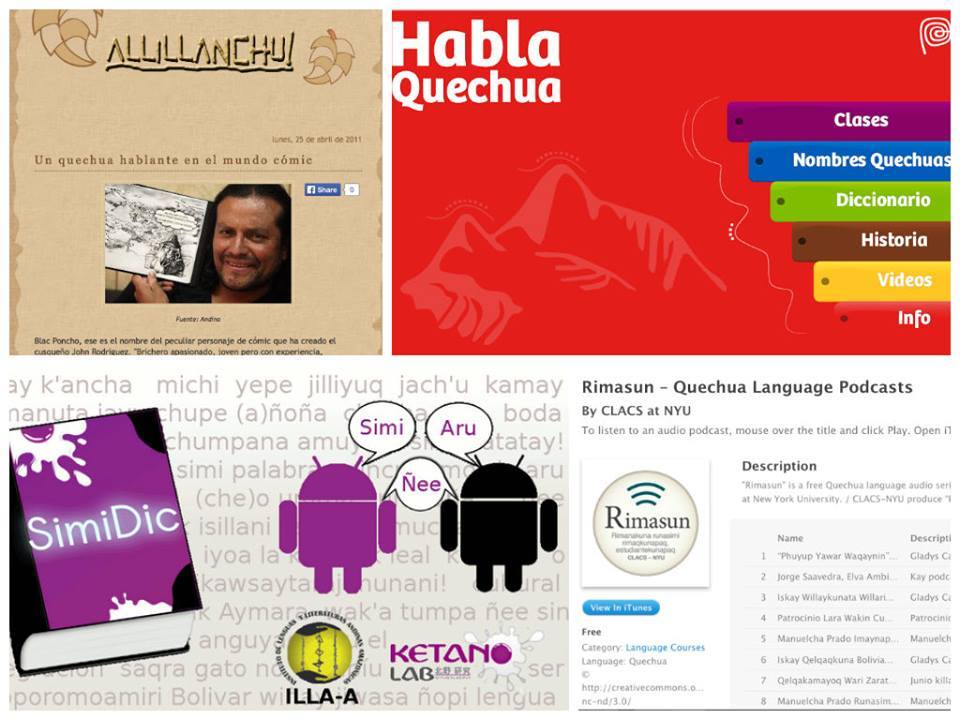
Collage of images created by the author, used with permission.
The following text, written by Américo Mendoza-Mori, originally appeared on the Peruvian website SienteMag. It is republished here with the author's permission.
There are several stereotypes about Quechua. Is it a dead language? No, there are an estimated 6 to 8 million speakers in South America. A simple language? You cannot imagine the suffixes this language contains. That it’s limited to agriculture, folk songs and shamanic sessions? No, many everyday conversations are held in Quechua.
In spite of discrimination, prohibitions, and a lack of institutions to promote it in the last few hundred years, this language family has much to offer.
Several universities throughout the world (England, Germany, the United States, France, etc.) teach Quechua with pride, while in Peru we treat its speakers like second-class citizens. There are rock and salsa groups that sing in Quechua. There are literary magazines and radio and television programs in Quechua. Add to this the great ancient knowledge preserved by their speakers.
For lovers of social media and smartphones, here is a list of useful courses for learning and promoting Quechua. It should be noted that Quechua is not really a language, but a language family. The courses mentioned here use mainly the variant known as Southern Quechua (which is what is spoken in Cusco, Ayacucho and Cochabamba). All are free.
1. Rimasun - iTunes
Do you like podcasts? The Center for Latin American Studies at New York University broadcasts a program that you can download to your iPhone or computer. They interview painters, musicians, professors and a myriad of other characters.
If you have a basic level of Quechua, the podcasts will help a lot, as they are intended for college students interested in the Andes. It can be downloaded for free from the website and iTunes.
2. Rimay.org – SoundCloud
In collaboration with Rising Voices, this site offers a collection of audio, including poems, songs and stories in Quechua from different parts of Peru. They can be downloaded via SoundCloud.
3. SimiDic – Android
This is a Quechua-Spanish dictionary that for now is only available on Android. It also offers dictionaries in Aymara-Spanish, Guaraní-Spanish, and Mapuche-Spanish. It shows up in the Apple AppStore, but at the moment it doesn't work. It can be downloaded from Google Play.
4. Habla Quechua (Speak Quechua) - iPhone and Android
The Minister of Foreign Trade and Tourism, through PromPeru, has launched a smartphone app where you can learn basic and useful phrases in Quechua. The format is fairly simple to use, designed for the tourist or those interested in Quechua.
The application has a problem, and that is that it includes some words that nobody uses. In the lesson about professional careers, it includes “Qelqa rimaq kamayoq’, which literally translates as ‘speaker of the written’, but the app translates it as ‘journalist’. On the other hand, the lesson on the days is correct, but the app uses the Castillian words to name the days; even though Quechua has its own words for them, they aren't normally used in everyday life.
What is this about? The Highest Academy of the Quechua Language in Cusco, which has collaborated in the development of this application, wants to avoid the ‘Castilianization’ of Quechua words so it invents words or brings back words already in disuse. While the intention is good, it’s obvious that Quechua and Castilian have coexisted for almost 500 years and inevitably along the way there have been linguistic exchanges and borrowing. There are many words from Spanish like ‘liwru’ (libro/book), ‘manna entendinichu’ (no entiendo/I don’t understand) or ‘manna parlanichu’ (no parlo/I don’t speak).
I can recommend all of the lessons from this app except the fourth (professions). Also included is a short dictionary and an impressive list of names in Quechua with their translations. You can download it from the Apple AppStore and from Google Play.
5. Allillanchu!
Lorena Chauca had a great deal of affection for Quechua, the language spoken by her grandparents. Her eagerness to learn spurred her to create the blog ‘Allillanchu!’, which has very useful resources and information not only for learning Quechua but for understanding songs and Andean culture.
Sadly, this young journalist died in an accident in 2012, but her love and dedication to disseminate Quechua is reflected in this course. She would surely be very happy to know that her blog is a tool used by many people.
Américo Mendoza-Mori is a young Peruvian researcher in cultural and creative ventures for Latin America, focusing on the Andes and Brazil. He is a cultural consultant. You can follow him on Twitter at: @ameriqo.








2 comments